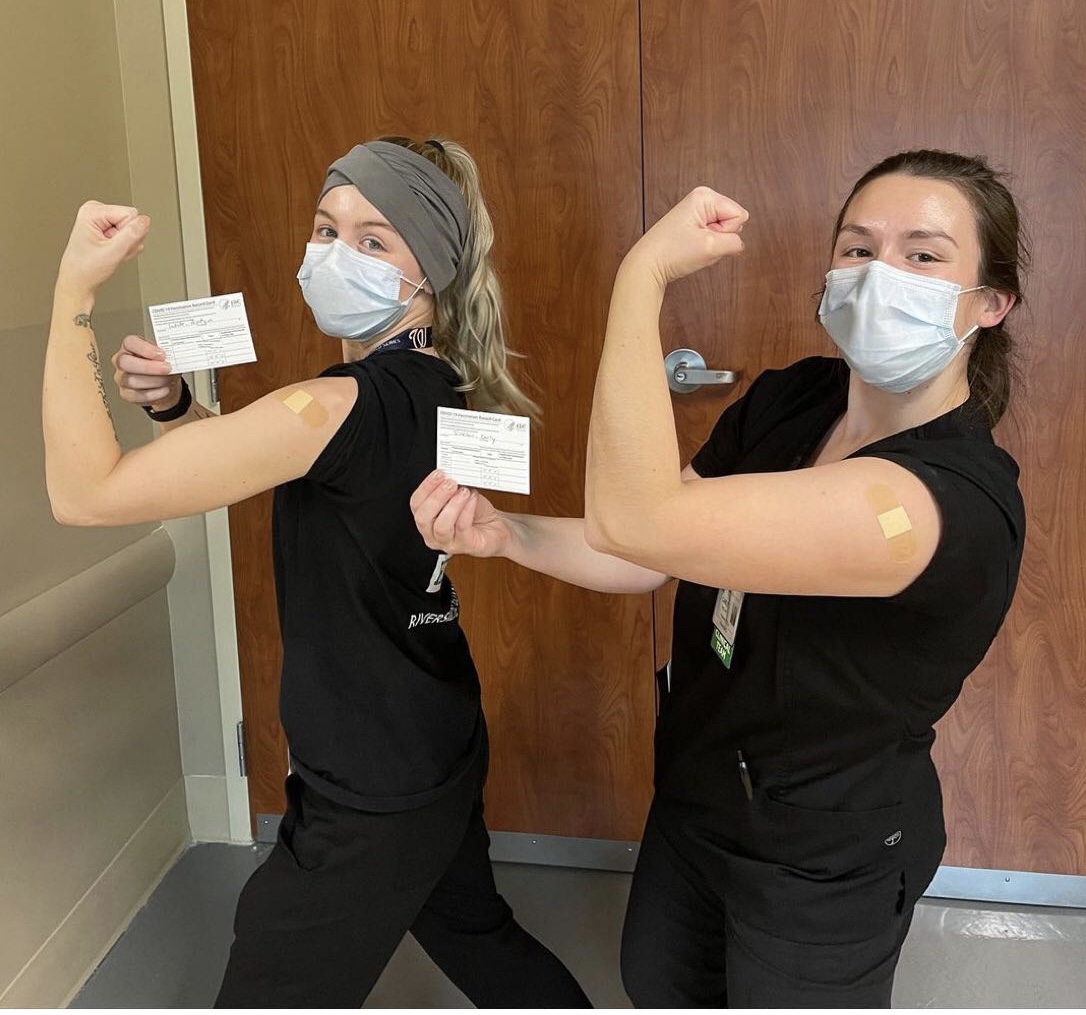On December 16, 2020, Riverside Health System administered the first dose of the COVID-19 vaccine to its frontline healthcare workers.
One year later, Riverside has administered 225,000 doses of the vaccine to 100,000 individuals. That includes the primary series — first and second doses of the Moderna and Pfizer vaccines and the one-dose Johnson & Johnson shot — and all boosters. Since the first vaccine was approved for emergency use authorization last December, Riverside Health System has collaborated with state and local officials to ensure all who want a vaccine receive one.
“We’ve made some tremendous strides, as Virginia continues to be in the top 10 in the United States for percentage of people vaccinated,” said Cindy Williams, Vice President and Chief Pharmacy Officer for Riverside Health System. “It’s been a journey that’s involved an enormous amount of effort by a number of individuals as well as collaboration from all the communities Riverside serves.”
Data provided by the Virginia Department of Health confirms that COVID vaccination not only reduces hospitalization, it saves lives. Between Jan. 17, 2021, and Dec. 4, 2021, unvaccinated Virginians were hospitalized at a rate four times that of fully vaccinated people and 1.4 times that of partially vaccinated people. During that same period, unvaccinated people died at a rate 3.9 times that of fully vaccinated people and 1.4 times that of partially vaccinated people.
“We know we have saved lives by administering the vaccine,” Williams said. “Science is clear that those who are vaccinated have a lower rate of hospitalization and death.”
Riverside began rollout of the vaccine on the day the initial doses arrived at the health system acute care facilities in ultra-cold shipping containers. The phased-in approach to vaccination prioritized first responders, healthcare workers and long-term care facility residents — individuals at the highest risk. The initial phase then moved to people 75 years and older and frontline essential workers not in healthcare.
Today, all adults 18 and older are eligible for the Modera and Janssen/Johnson and Johnson COVID-19 vaccine and the Pfizer vaccine is authorized for everyone ages 5 and older. The Centers for Disease Control (CDC) recommends those who received the Moderna or Pfizer vaccines at least six months ago or the Johnson & Johnson vaccine two months ago receive a booster shot.
After every vaccination clinic, the Riverside team debriefs and reviews the protocol in an effort to consistently provide a positive patient experience and efficient process. “Regardless of who the customer is, we want to make receiving the vaccine the best possible experience,” Williams said.
Safety standards are never compromised.
“Whatever type of clinic Riverside offers, we make sure that we administer the vaccine safely and in compliance with CDC guidelines,” Williams said. “Everything we did, and even the work we do today, especially now that we have pediatric vaccines, we ask how can we do this safely? We make sure we get the right vaccine to the right individual at the right dose at the right time.”
Community collaboration has been vital. Not everyone is able to travel to a Riverside facility, so the Riverside team has dispersed into the community for distribution. These sites have included the Hampton Roads Convention Center, Christopher Newport University, Colonial Williamsburg Regional Visitors Center, local schools and community events.
“Being able to leverage our community partners as well as working with our health departments, municipalities and other key stakeholders have really allowed us to significantly expand the footprint of where vaccines are offered in the community,” Williams said. “These community-based clinics are targeted to focus on populations where they are.”
For example, Riverside staff will host a third vaccination clinic at the homeless shelter for the City of Newport News on Dec. 16.
While Williams does anticipate a winter surge due to colder temperatures forcing more people indoors and an uptick in travel plans related to the holidays, she doesn’t expect the numbers to be nearly as high as those of last winter.
“Last winter we didn’t have high vaccination rates,” she said.
The rise of the Delta variant drove another spike over the summer and children returning to school in the fall also led to a rise in cases. “But we didn’t return to the high levels of inpatient hospitalization,” Williams said. “Last winter was certainly the worst we have seen as far as the volume of patients in our hospitals. People were sick and they stayed there a long time. We have definitely seen improvement in that area thanks to the vaccines.”
Data is thin on the relatively new Omicron variant, but Williams is reassured by reports that those with vaccination are not getting seriously ill.
“If you have not had your primary series of shots or if you’re now eligible for a booster, it makes sense to go ahead and get that taken care of now,” she suggested. “The booster gives you an extra level of protection against the Omicron variant.”
Williams also stresses that the vaccine remains one layer of protection against the virus. Other measures should also be followed to reduce transmission. They include wearing a mask in a public setting, social distancing and hand hygiene.
“Stay at home if you’re not feeling well,” she said. “As a society, we need to step back and reconsider our practices and make sure we are doing everything we can to protect those around us, especially our friends and family who are more vulnerable because of age or because of health status as we approach Christmas.”
Vaccines can be scheduled online through Riverside or by locating a provider near you at vaccines.gov.
